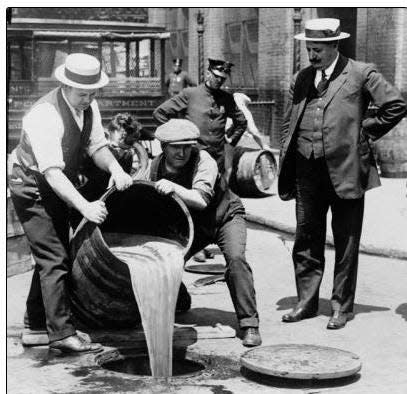How 'Three-Gun' Wilson led Prohibition fight against bootleggers and jellyfish officials
- Oops!Something went wrong.Please try again later.
“Let no one tell you the temperance-prohibition laws cannot be enforced,” Harold “Three-Gun” Wilson, deputy Prohibition administrator for Delaware, announced at a meeting in Seaford of the Sussex Woman’s Christian Temperance Union.
According to the Dec. 12, 1930, edition of the Milford Chronicle, Wilson maintained, “They [prohibition laws] can be and they are [enforced] except in places where jellyfish officials bend the knee to grafting politicians.”
Wilson was born in Cawker City, Kansas, in 1884, and when he was a small child, his family moved to Shelburne Falls, Massachusetts. After attending Tufts College near Boston, Wilson worked as a reporter, editor and publisher.

In 1920, Prohibition began when the 18th Amendment to the Constitution took effect, and intoxicating beverages were outlawed in the United States. To help enforce the newly enacted laws restricting alcoholic drinks, Wilson was appointed to the Chief Prohibition Enforcement Office in Massachusetts.
Determined to enforce the liquor laws at whatever the cost, he arrested a number of high-ranking associates of the governor of Massachusetts, and the jellyfish officials were out for his scalp. Forced to resign as a Prohibition enforcement agent, Wilson continued his crusade from the sidelines, while he wrote an account of his experiences in a book, "Dry Laws and Wet Politicians."
Accused of being a publicity hound, it was said that Wilson acquired the nickname “Three-Gun” when he was given a pair of pistols by an admirer, adding them to the one that he already carried.
COLUMN: Exposing coastal secrets: Bathroom pavilions, beer hopping and pet preferences
STATE DOG: So long, Golden Retriever. Delaware has new official state dog
In 1930, Wilson was appointed a Prohibition enforcement agent for Delaware. It immediately became apparent that a new sheriff was in town, when Wilson proclaimed that he would rally public support to put the “filthy, lazy, desperado who is commercializing in liquor” in jail.
Wilson believed that most of the Delaware Prohibition agents were known to the bootleggers, and he recruited agents from Philadelphia and New Jersey. These agents worked for several weeks to determine the locations of several Wilmington speakeasies, which enabled Wilson to raid over a half-dozen of these illegal establishments and make 23 arrests.
Next, he sent undercover agents into the southern part of the state, and in February 1931, they had gathered enough evidence to conduct raids on eight houses and gas stations in Delmar and Seaford.
Wilson and his agents moved on to Lewes, where the Sunday Morning Star reported that, “A 25-gallon still is said to have been found in operation in the home of George Showell … A large quantity of mash was also seized. Showell was not in the house to ‘welcome’ the agents but the latter soon expect to apprehend him. The agents then raided the home of Rhoda Gunby … and found a small quantity of liquor.”
The Gunby home was across the street from the Lewes Auditorium, where Wilson gave a stirring speech before a packed house of several hundred people.

According to the Delaware Coast News, “Mr. Wilson stated that bootleggers were a very low type of person and…he had found them to be yellow and cowardly and undersized either mentally or physically.”
Having made several arrests and given a rousing speech, Harold “Three-Gun” Wilson left Lewes and returned to Wilmington, but he did not remain there long.
The flamboyant “Three-Gun” Wilson had worn out his welcome in Delaware, and what may have been the work of jellyfish officials, he was transferred to Nebraska until 1933, when Prohibition was repealed and his services were no longer needed.
Principal sources
Milford Chronicle, Dec. 12, 1930.
Wilson, Harold D., "Dry Laws and Wet Politicians," Boston: Internal Publishers, 1922, pp i, 9-17, 28-30.
Sunday Morning Star, Feb. 22, 1931.
This article originally appeared on Salisbury Daily Times: When a Prohibition agent took on Del. bootleggers, jellyfish officials
